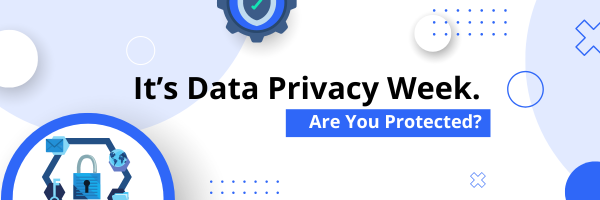Trinity IT prioritizes the protection and security of our customers’ and employees personal information every day. We encourage our readers to use this Data Privacy Week to learn more about how you can protect your personal data.
In today’s digital age, our personal information is everywhere. That’s why Data Privacy Week exists - it’s a week to bring awareness to the use of our personal information, advocate for stronger privacy laws, and educate ourselves about protecting our personal data.
More companies have your information that you may realize. Your data isn’t just available to the platforms that you create an account with. Every time you click on an advertisement that calls out to you, that company is quietly storing your data and remembering it for the next time you’re browsing the internet. Have you ever wondered how that online store knows exactly what you want to see? Cookies.
What are Cookies?
Internet cookies are tiny digital files that store information on a user’s device from the websites they browse. The purpose of cookies is to make your user experience easy to use and tailored to your interests. If you have ever created an account for a website, then that website’s cookies have the unique data specific to your device as well as your personal information. When the website asks to save your password - those are cookies at work making your next visit seamless.
Be Aware. Protect Your Privacy.
Cookies have been around since the mid-90s, but many people didn’t know about them until a few years ago, when suddenly every website had a pop-up asking for consent to use cookies. Thanks to the California Consumer Privacy Act of 2018, individuals have the right to control what personal data they share.
While it may be frustrating to click “manage my cookie preferences” on every website - even if you’re just visiting it for a second - it’s important to be conscientious about who you’re giving your data to. The up-front convenience of hastily clicking “accept all cookies” may result in a breach of your privacy if you’ve given consent to the wrong site.
Protecting your privacy goes beyond being aware of website cookies. You need to be mindful of account passwords, using wifi that is password protected, understanding the privacy policy for the software and devices you use, and so much more. Educating yourself is vital.
Tips for Protecting Your Privacy:
- Unique passwords - Change all of your passwords regularly and make sure you’re not using the same password for every site. Use a long password with a combination of numbers, symbols, capital and lowercase letters.
- Two-Factor Authentication (2FA) - A great way to make sure that only you have access to your important accounts is to use 2FA, which adds a second log-in step to your account. Usually this means receiving a text, call, or email with a single-use code to prove that you’re you.
- Use secure Wi-Fi - When setting up your home or office Wi-Fi, make sure it is password protected with a unique, complex password! Avoid using public Wi-Fi that isn’t password protected when handling sensitive information on your device. If you regularly use public Wi-Fi, consider downloading a Virtual Private Network (VPN) app on your device for extra protection.
- Secure your devices - Use passcodes to access all of your devices, and make sure each one is unique.
- Update your apps - Software updates are available regularly for a reason. They help safeguard your data, because outdated software is more easily breached.
- Monitor your bank accounts - Ideally, you’ve put enough security measures in place to protect your financial information. However, it’s necessary to do frequent and regular checks of all of your bank accounts to make sure no unauthorized transactions snuck in there. If there are any, be sure to freeze your account immediately and report it to the financial institution.
Learn More About Data Privacy Protection
There is an abundance of resources available for education on protecting your personal data. The United States’ National Cybersecurity Alliance (NCA) is a great resource for anyone looking to understand more about data protection.
,
